The key traits of A Song of Ice and Fire
So what’s a better comparison? Well, I’d preface that by saying that I think to some extent that such things are a product of one’s reading experience.
That being said, let’s look at the underlying traits of the series since I think that provides a useful starting point. I think it’s pretty fair to distill A Song of Ice and Fire down to the following five key things. I feel that the series is:
- Epic in span with an ensemble cast. World-spanning scope and a large cast who get equal time? Check.
- Driven by politics and power. As Cersei Lannister says bluntly to Ned Stark, in Westeros when you play the game of thrones, you win or you die.
- Essentially anti-heroic. Westeros might have knights, but is anyone really a white knight? Brienne? Daenerys? Arya? Jon Snow? Brienne is probably the closest, the others all have made compromises of one sort or another to survive.
- Hobbesian in nature. It’s a dog-eat-dog universe. Showing mercy to an enemy generally rebounds badly.
- Low in magic. Sorcery? Fireballs? Not much of that here at all, particularly in the early novels.
The last point is noteworthy. TORn staffer Ostadan observed that, in this sense, ASOIAF is a curious inverse of Tolkien. Tolkien writes about magic disappearing from the world; ASOIAF is about its return.
Still, to my mind, those first four really encompass the thrust of RR Martin’s ASOIAF. Consequently, in looking for authorial comparisons I’ve focused on authors that I feel match those traits the best.
Melanie Rawn — the Sunrunner sextet and the Exiles Trilogy
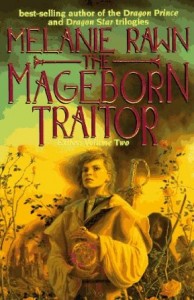 In many ways Rawn’s Sunrunner sextet (published between 1988 and 1994) is a Lighter and Softer rendition of RR Martin with a magical focus. The first three books sets two power blocs of feudalistic princedoms against each other in an ongoing battle for geo-political dominance while a nominally neutral magical sect called Sunrunners tries its best to sway the outcome without actually being seen to be interfering. The second three introduce an outside enemy and a lot more fatalities.
In many ways Rawn’s Sunrunner sextet (published between 1988 and 1994) is a Lighter and Softer rendition of RR Martin with a magical focus. The first three books sets two power blocs of feudalistic princedoms against each other in an ongoing battle for geo-political dominance while a nominally neutral magical sect called Sunrunners tries its best to sway the outcome without actually being seen to be interfering. The second three introduce an outside enemy and a lot more fatalities.
Her followup Exiles trilogy is a darker-tinged play of politics and magic set in a matriarchal world trying to resurrect itself culturally and economically out of the ruins of an apocalyptic mage war. It’s both more complex, with dozens of characters vying for political and economic control, and more compelling reading. It’s also been frustratingly unfinished for the last 16 years, a situation that is most unlikely to change.
Janny Wurts — The Daughter of the Empire series
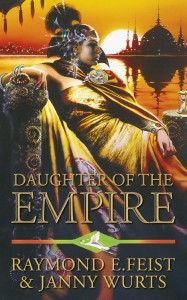 Wurts co-wrote this series with the author of the Riftwar saga, Raymond Feist. But where Riftwar was all about saving the world from evil forces beyond mortal ken, the Empire series is about the brutal cut and thrust of the “Great Game” as factions vie for the title of “Warlord” in a world that owes much inspiration to Daimyo-era Japan.
Wurts co-wrote this series with the author of the Riftwar saga, Raymond Feist. But where Riftwar was all about saving the world from evil forces beyond mortal ken, the Empire series is about the brutal cut and thrust of the “Great Game” as factions vie for the title of “Warlord” in a world that owes much inspiration to Daimyo-era Japan.
The protagonist, Lady Mara, battles first to ensure the survival of her House in a system that respects no weakness, and eventually to wholly reinvent a culture that is stagnating due to rigid adherence to tradition.
Michael Moorcock — The Eternal Champion
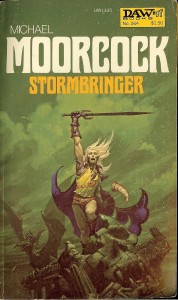 Michael Moorcock’s Eternal Champion is exactly what it says on the tin: a hero doomed through all his (and occasionally, her) incarnations to save various worlds — and their pitiful mortal inhabitants — from an eternal and internecine war between Law and Chaos.
Michael Moorcock’s Eternal Champion is exactly what it says on the tin: a hero doomed through all his (and occasionally, her) incarnations to save various worlds — and their pitiful mortal inhabitants — from an eternal and internecine war between Law and Chaos.
The albino sorceror and swordsman Elric of Melnibone` is probably the best known — and most miserable — of all these incarnations. Poor old Elric, in the course of trying to deny fate, commits the sort of crimes that might have made Pol Pot blush (or perhaps not). Trying to not give too much away, but this fellow is positively Byronic — he even needs a daily cocktail of drugs (or souls fed to him through his hellsword called Stormbringer) to keep him alert.
Trivia: Elric’s half-alive black-metal hellsword that speaks once at the very end of the series is not actually a nod to Tolkien’s Turin. Both Moorcock and Tolkien were independently inspired by the same source — Kullervo in the Finnish epic The Kalevala.
Stephen R Donaldson — The Chronicles of Thomas Covenant
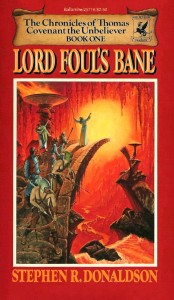 Donaldson tries hard to win the title of most unlikeable protagonist ever with Thomas Covenant. Covenant — a leper from modern times — falls into a fantasy realm of magic and monsters called The Land that is threatened by a maleovolent being called The Despiser.
Donaldson tries hard to win the title of most unlikeable protagonist ever with Thomas Covenant. Covenant — a leper from modern times — falls into a fantasy realm of magic and monsters called The Land that is threatened by a maleovolent being called The Despiser.
Our “hero” commits a morally repugnant act within the first hundred pages, cynically denies the reality of his new existence and then spends the next three books half-heartedly trying, and usually failing, to atone for his crime, while simultaneously dodging his responsibility to save The Land from its tormenter, and letting The Land’s key servants (some of whom are his friends) get toasted in his place. Cheery stuff.
Tad Williams — The Memory, Sorrow and Thorn trilogy
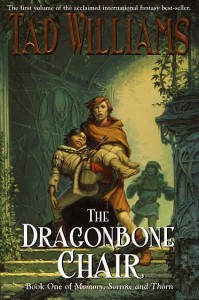 Williams’ doorstopper-sized Memory, Sorrow and Thorn series is essentially a bildungsroman wrapped in an epic fantasy. We follow a callow young boy on the cusp of manhood who is unwittingly caught up in a civil war of human kingdoms, and almost by accident helps unearth a larger revenge plot that threatens all the races of the continent of Osten Ard.
Williams’ doorstopper-sized Memory, Sorrow and Thorn series is essentially a bildungsroman wrapped in an epic fantasy. We follow a callow young boy on the cusp of manhood who is unwittingly caught up in a civil war of human kingdoms, and almost by accident helps unearth a larger revenge plot that threatens all the races of the continent of Osten Ard.
It’s a cleverly constructed series that balances we’re-all-doomed grittiness with hope, and intrigue with action. Williams deftly juggles a veritable orchestra of major and minor characters, brings mortal foes together in previously unthinkable alliances, and regularly knocks off various Good Guys as they desperately fight a rearguard action to work out what the Big Bad has planned, and how to counter it before it’s too late.
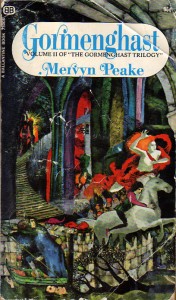 Mervyn Peake — Gormenghast
Mervyn Peake — Gormenghast
Arguably the strangest fantasy ever written. Gormenghast is a peculiar, self-contained castle-world of crumbling baroque splendour, where the ruling family is tied to a stultifying life of tedious, never-ending ceremonies that serve no purpose and are only performed because that’s the way its always been. Then two new characters, Titus Groan and Steerspike, arrive and change everything.
The descriptive prose is some of the finest you’ll ever read, but the pace is glacial. Dan Brown or [insert characterless page-turner author] this is not. But, like RR Martin, it’s one of the very few fantasies that features no magic whatsoever.


